
Is searching the web with bing less likely to nurse a person’s tiny inner troll into a democracy wrecking monster?
Microsoft (MSFT)’s search engine doesn’t even register as a traffic source on Parse.ly’s dashboard tracking the top sources of web referral, but that doesn’t necessarily mean that Bing’s results are bad. Meanwhile, there’s real reason to worry about how Google (GOOGL) steers web users.
Last week Paste Magazine posted an intriguing article contending that the political right has built up a network of websites that post similar content with similar angles in dozens of different places. By posting similar wackiness in lots of places, it explains, the insanity looks more credible when viewed through the lens of Google. If a user runs a search for a particular vein of alternative facts, they will get so many similar results that it could almost look true. Reading it made us wonder if the same tricks also warp results on other search engines, such as Microsoft’s Bing and France’s privacy-focused site, Qwant.
Google and Facebook are the two main ways that people find media, as we’ve previously reported. No other search engine drives a significant portion of overall web traffic.
The writer of Paste‘s piece, Roger Sollenberger, attests that he has experience with SEO hacking, having previously worked at a small firm in a competitive industry that managed to worm its way to the top of Google. He demonstrates that when people search for red meat conservative topics, Google tends to surface lots of very similar posts from non-mainstream websites. The post argues that this is accomplished using clever search engine optimization (SEO) tricks, such as cross-linking heavily. No one knows exactly how Google prioritizes search results, but people who have tested and retested the algorithms have found tricks to make certain content rise above others.
So do the same tricks work as well on Bing and Qwant?
Search I: “obama classified information bin laden”
First, we tried the same two searches that Paste did to demonstrate the power of SEO in the post. The first one he wrote about was “obama classified information bin laden.” It came up following the accusations that Trump had revealed information he shouldn’t to Russian diplomats. When Paste ran the test, all the results on the front page were from highly questionable sites, like The Federalist and Trump Train News. The very last result on the front page leads to the Pulitzer-prize winning website, Politifact, the only reputable outlet on the page.
We ran the same search Monday, and the Google results were about the same:


It’s worth a note of caution that not everyone will get the same results for the same Google search. The site was long ago found to have a “filter bubble,” meaning it targeted results to what it believed the person searching wanted. The company may or may not have reined this in. It’s one of those questions it’s tough to get a straight answer to.
So were Bing’s results comparably wacky? No. When we ran this result yesterday, Bing recommended several more mainstream sites:
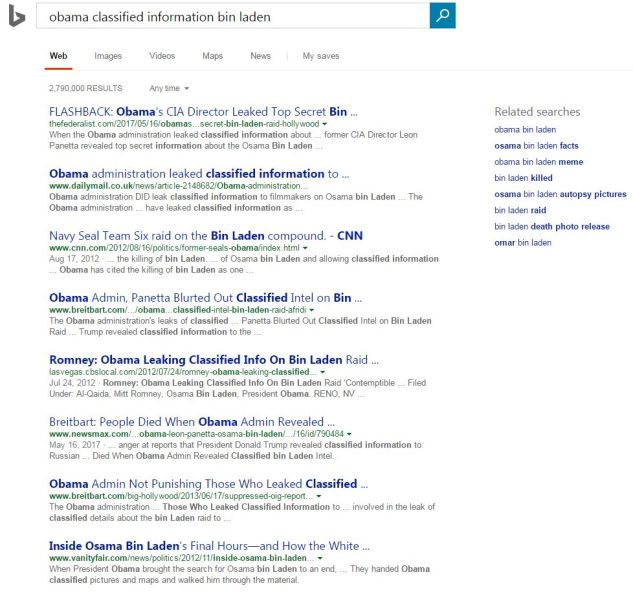

The third result is CNN, the fifth is a local CBS affiliate and the eighth is Vanity Fair. No, the “lamestream media” doesn’t always follow the right story and it’s far from infallible, but we understand what its standards are, how it operates and how to hold these sources accountable. It’s encouraging to see some reputable sites mixed in with the digital dittoheads of Breitbart and The Federalist.
We wanted to highlight Qwant for this story, though, because it uses an interesting design that separates web results from news sources and social. All show up on the page, but it’s easy to see which is which. This feels like a useful innovation. DuckDuckGo is another privacy-oriented search engine that we’ve covered before.


So here the purveyors of alternative facts still get their say, but under “web,” not “news.” Right alongside their posts, sites like CNN and CBS show up, creating a distinction in the quality of sources. In this particular case, though, it doesn’t look like the two sets of results directly address the same topic, however. We’ll later find that Qwant may not be quite up to the task of delineating which sources should defined as news, either. But it’s a nice idea.
Search II. “trump no evidence collusion”
Sollenberger wanted to run this search in order to tell a story about how the Trump administration is throwing a veil of doubts over mounting allegations that the president is too cozy with Moscow. When he ran his search, he got results from RealClearPolitics and The Hill, but writes that there’s not a single mainstream site in his results. Those two sites seem perfectly fine, even if they aren’t household names.
When we ran the search Monday, our results were similar, but not exactly the same. Newsweek shows up at the top. Forbes shows up in the web results (though it looks like its a result from a contributor, not a staff writer). Google swapped The Weekly Standard for The Daily Caller as a right-wing news source at the top.


Interestingly, Bing’s search layout really changes for this query. It breaks out news results first (that last one is the website of an independent journalist who previously worked for CBS News for many years). Then Bing throws some YouTube videos in the middle (which mostly look like folks ranting for their web cams) and then ends with what appears to be overall web results (yet the first one is from NBC).
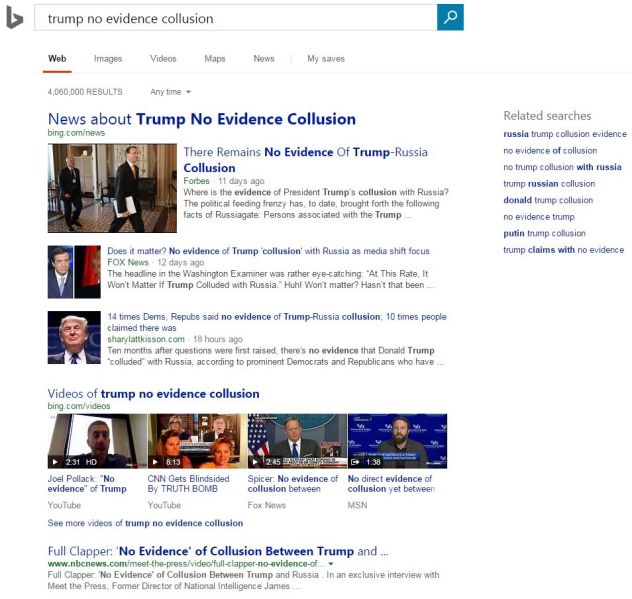

This search is tough, though, because it apes a talking point that only the right wants to discuss, so it’s less surprising that it surfaces a bunch of similar results.
Qwant totally chokes in the news section for this result. Its second and third results under news are both from Russian state-owned news agencies. Honestly, which is worse? Unscrupulously biased sources or those that exist mainly to advance the agenda of one of the world’s great dictators? As The New York Times executive editor, Dean Baquet said at SXSW, if a news source isn’t engaged in “an honorable pursuit of the truth,” it shouldn’t be credentialed as journalistic.
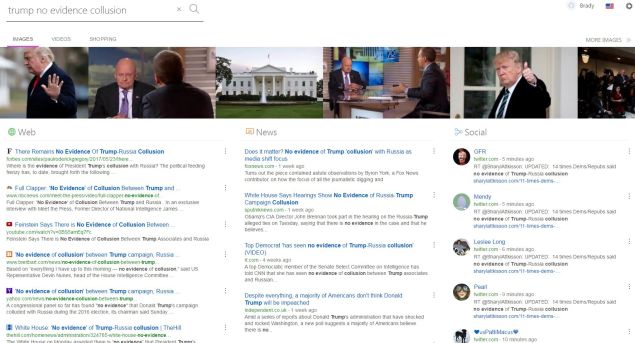

Unlike the prior search, this one is recent enough that it lit up the social search function on the site, though mainly we see social media users eager to cut and paste the party line. Let’s hear it for fearless independence.
Next, we did some searches of our own. We opened up the leading alt-right site, Breitbart News, for inspiration.
Fun fact about Breitbart: the site publishes a little speech bubble alongside every headline to show how many comments a given story received on the site and on Facebook. Every single post on the front page when we looked yesterday had a big fat zero in that little icon. Today? Same thing. We went into the Internet Archive to look at the front page a year ago and see if it had been better then, but no: all zeros then too. It’s hard to understand why they include this widget in their design when it looks so bad.
We did find one story that Breitbart readers wanted to talk about, though. This one: Katy Perry in Manchester: ‘Touch the Person Next to You’ and Tell Them ‘I Love You’ to Help ‘Conquer Hate.’ It had over 30 comments when we looked yesterday, but now it’s up to 50 (and more than 27,000 shares on Facebook).
OK Breitbart readers. We see you. We know who you are now.
Search III: Katy Perry Manchester
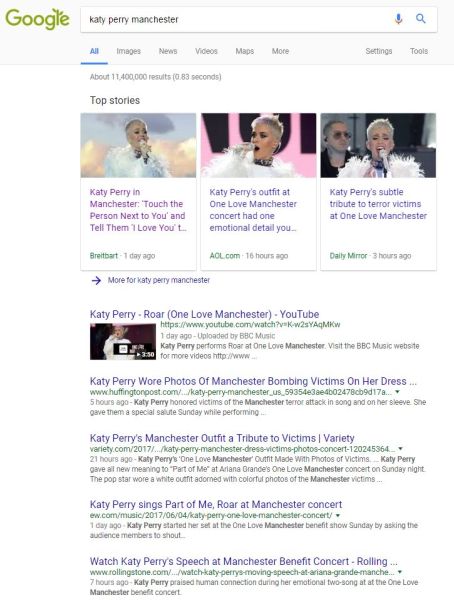

This helps add some color to the story Sollenberger wrote. Nothing about this undermines his larger point, but it does show that even on topics where the right has tried to weigh in, they can’t necessarily dominate the conversation with high middle-of-the-road and apolitical interest. It is somewhat remarkable that Breitbart has the top story on a Katy Perry show and Rolling Stone is down there in search result dregs, however. The Alphabet posse might want to have a look at that.
In fact, Bing’s having none of it. “This is a music story,” Microsoft’s wannabe search engine appears to retort, and Rolling Stone gets the top link. E! and People also come in ahead of Breitbart as well.
I’m no expert on Ms. Perry, but this seems reasonable.
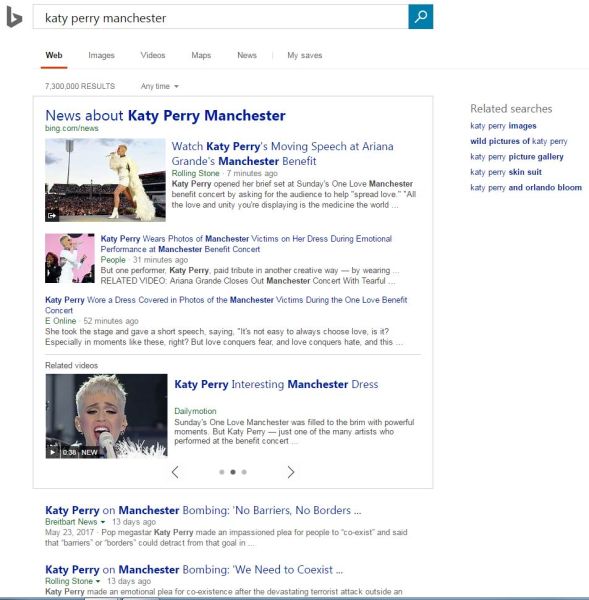

Lastly, Qwant has the most well-rounded perspective on this event with its results, though somehow Breitbart still ranks very high. There’s something we don’t understand here, but we’ll leave it for now.


Search IV: “judges immigration laws”
The top story on Breitbart when we visted yesterday was one about judges humiliated by the way they were made to enforce immigration laws (honestly, it’s a tough story to follow). This seemed like it hit the conservative buttons, though, so we ran tested it.
Google doesn’t seem to be bogged down by the right wing echo chamber at all on this one. It has three links the Department of Justice and one to The New York Times. Yes, Breitbart leads the news results at the top, but it was also the only site writing this story at the time of yesterday’s search.
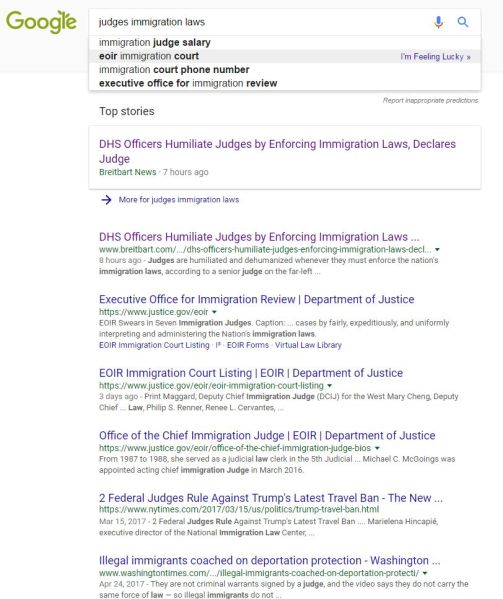

Then Bing really crushes this search, delivering a wide array of perspectives on a complicated topic, mostly from reputable outlets.
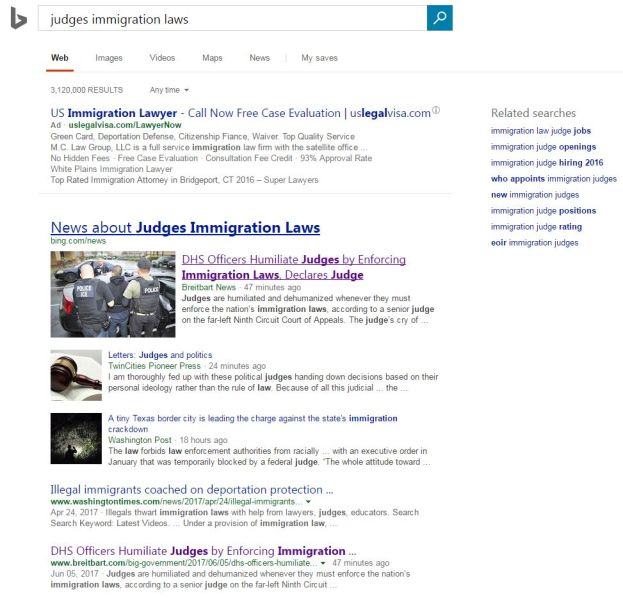

Aside from a completely bizarre first post about unionizing a car wash under “news,” Qwant delivers a sort of hybrid of the two approaches, with a bit of commentary from the lumpen tossed in under the social column.
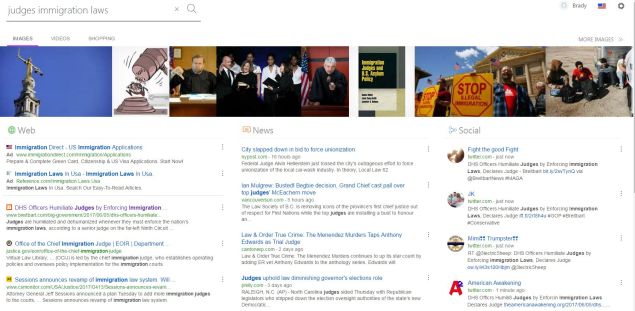

Search V: “travel ban uk attacks”
Breitbart also posted a story Monday backing Trump’s call for a travel ban subsequent to attacks in the United Kingdom. If the right really have managed to control the dialogue online, this felt like one that would be easy for those sites to dominate.
Not so much. This was a legitimately huge story, and Google knew well enough to turn it over to sites like CNN and Reuters. Good job, Mountain View.


Bing also doesn’t appear very interested in letting the peanut gallery take over at an important historical moment. It has results from ABC and the BBC, with a couple helpings of the “fair and balanced” Fox News in the mix.
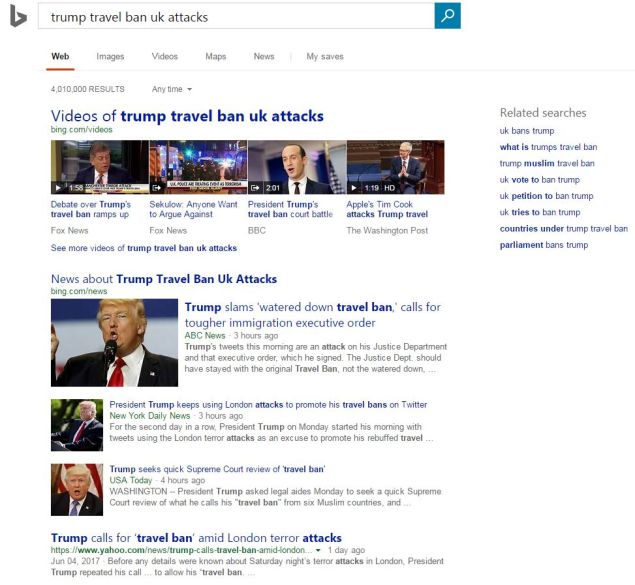

Lastly, Qwant: the standout result here shows that apparently AOL still stumbles along in the UK. Fascinating. Do they still use AIM in that newsroom? We’ll save that for a future post.
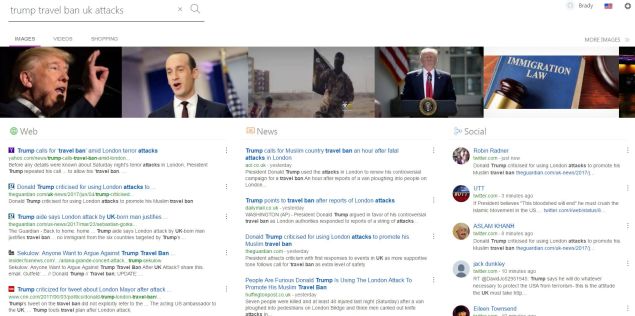

So after running through these five searches, Paste‘s case remains strong, but the situation also isn’t quite so dire. These results suggest that when the right is able to define a narrow viewpoint that inspires its base, it really can use its echo chamber to orchestrate an appearance of consensus. On the other hand, it also doesn’t look like that echo chamber is powerful enough to outshout the larger discussion when real news and real facts have both the mainstream and the extremes engaged.
That said, it does appear that Google is susceptible to an SEO strategy when the right really leans into its readers’ confirmation bias. Bing, on the other hand, does a better job of trying to mix in alternative viewpoints and more reliable reporting, even if it can’t find anyone from the mainstream talking about whatever Breitbart readers have gotten worked up about. Even just throwing in some tangentially relevant Washington Post or Vox stories helps to remind folks who’ve bought homes in Crazy Town that there’s other people living healthy lives beyond city limits.